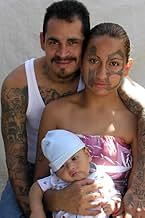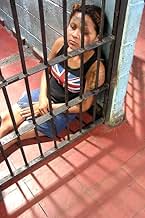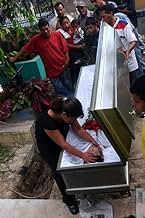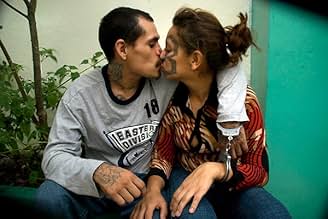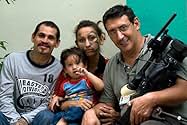La vida loca
- 2008
- 1 h 30 min
AVALIAÇÃO DA IMDb
6,8/10
1 mil
SUA AVALIAÇÃO
Adicionar um enredo no seu idiomaFollows members of "la dieciocho" gang in a poor San Salvador neighborhood, showing their bleak reality. Photojournalist Christian Poveda captures life in the 18th Street gang.Follows members of "la dieciocho" gang in a poor San Salvador neighborhood, showing their bleak reality. Photojournalist Christian Poveda captures life in the 18th Street gang.Follows members of "la dieciocho" gang in a poor San Salvador neighborhood, showing their bleak reality. Photojournalist Christian Poveda captures life in the 18th Street gang.
- Prêmios
- 2 indicações no total
Avaliações em destaque
In stark contrast to the tranquility of the little painted houses in a tree-lined suburban housing estate in El Salvador, a violent gang culture permanently kills, maims or has jailed the young of the community. With a rate of 9 murders a day amongst the young, the country is caught in a massive gang feud. The gangs, and the feud, originate from the 1980s run- down south central Los Angeles. The problem could have been contained, considers Poveda, were it not that in 1996, the US government (under Clinton) decided to send 100,000 convicted gang members from US prisons to central America. Combined with a foreign policy of supporting dictatorships and financing civil wars, the scene has been set for human tragedy.
The fearless photographer and documentary-maker Christian Poveda submerges himself into central America a decade later, into the underbelly of society. He managed to get permission from the Salvadorian police and one of the gangs, the "18", to follow them in their lives. Four years later, La Vida Loca sees the light, taking you along the path of violent outcasts of society. And it is very different to what you might imagine.
The documentary takes us from the unfolding of someone's life to their funeral after a shooting. It is an endless spiral of gang violence, with seemingly no point to the gang war whatsoever, other than that of having an enemy to unite them. Joining a gang is not even an alternative employer for the poor, as the gang does not offer any external symbols of success (wealth, privilege, whatever). In fact, the gang does not seem to offer anything at all but the prospect of death, jail or invalidity. Hardly the attractive option, but these youths are already broken by their lives. And change becomes inevitable with the gang tattoos (voluntary or forced) marking their allegiance. Once you are have your face covered in tattoos, you can no longer send your CV anywhere. They can not back down.
The film lets the youths talk for themselves. They talk about their broken pasts, of growing up without the guiding support of a family. They speak of the love they get from the gang. They talk, with a peculiar detachment, of passing from one social service (juvenile detention) to another (jail), exposing an existential loneliness at the impoverished fringe in which they live. The gang might not offer the flash of fast cars, bikinis and swimming pools, but it does offer loyalty, stability and a shared suffering. The love of the gang is a love which fills an emotional void, giving them a sense of belonging amongst their peers. The gang is so much an end in itself that its members do not even fear death for it, but rather they expect it. The gang is not the path to wealth, status or happiness but rather a goal in itself. An end. But their fearlessness does not come from a feeling of superiority, what you might expect, but rather from an all-round stunted emotional development born out of their misery. They are phlegmatic, almost accepting their fate as a given. And hence they can tattoo themselves, as a confirmation of their fate, as whatever should befall them would befall them anyway.
But some do try. Christian Poveda follows a re-insertion program, where ex-gang members try to set up a bakery. We see them, the tattoo-ed ex-bullies, kneading the dough, we know they are serious about doing the right thing, of trying to improve their lives despite expectations. We see them pray, and talk with priests, but it is as if the words just float over their heads. When push comes to shove, who knows what they will do.
As tragic as the lives of the gang members are, as surprising it is to see that there is a normal society outside the walls of their lives. When they get hurt, they find themselves in a capable hospital, with all health services paid for by the state. When they find themselves in court, they are confronted with seemingly capable legal actors. When they are confronted with the police, they seem professional and organized. You might expect the gangsters to be aggressive ego-tripping characters, perhaps even with dubious contacts in the judiciary, but they are not like that at all. At least, they are not presented that way. When they are stopped by the police, they let themselves be searched or taken. When in court, they hear the court's verdicts stoically, accepting their fate as givens. Of course it is that same stoicism which makes them untouchable, even from punishment. Everything is pointless.
Seeing the film today, so shortly after director Christian Poveda was shot dead in El Salvador, makes the film all the more moving. It is a unique chance to meet people you will never meet, and hear words you will never hear spoken. A look into a violent, criminal subculture normally hidden from view. A testament to a culture which so badly needs understanding, to, hopefully, one day rest in the past. (incitatus.org)
The fearless photographer and documentary-maker Christian Poveda submerges himself into central America a decade later, into the underbelly of society. He managed to get permission from the Salvadorian police and one of the gangs, the "18", to follow them in their lives. Four years later, La Vida Loca sees the light, taking you along the path of violent outcasts of society. And it is very different to what you might imagine.
The documentary takes us from the unfolding of someone's life to their funeral after a shooting. It is an endless spiral of gang violence, with seemingly no point to the gang war whatsoever, other than that of having an enemy to unite them. Joining a gang is not even an alternative employer for the poor, as the gang does not offer any external symbols of success (wealth, privilege, whatever). In fact, the gang does not seem to offer anything at all but the prospect of death, jail or invalidity. Hardly the attractive option, but these youths are already broken by their lives. And change becomes inevitable with the gang tattoos (voluntary or forced) marking their allegiance. Once you are have your face covered in tattoos, you can no longer send your CV anywhere. They can not back down.
The film lets the youths talk for themselves. They talk about their broken pasts, of growing up without the guiding support of a family. They speak of the love they get from the gang. They talk, with a peculiar detachment, of passing from one social service (juvenile detention) to another (jail), exposing an existential loneliness at the impoverished fringe in which they live. The gang might not offer the flash of fast cars, bikinis and swimming pools, but it does offer loyalty, stability and a shared suffering. The love of the gang is a love which fills an emotional void, giving them a sense of belonging amongst their peers. The gang is so much an end in itself that its members do not even fear death for it, but rather they expect it. The gang is not the path to wealth, status or happiness but rather a goal in itself. An end. But their fearlessness does not come from a feeling of superiority, what you might expect, but rather from an all-round stunted emotional development born out of their misery. They are phlegmatic, almost accepting their fate as a given. And hence they can tattoo themselves, as a confirmation of their fate, as whatever should befall them would befall them anyway.
But some do try. Christian Poveda follows a re-insertion program, where ex-gang members try to set up a bakery. We see them, the tattoo-ed ex-bullies, kneading the dough, we know they are serious about doing the right thing, of trying to improve their lives despite expectations. We see them pray, and talk with priests, but it is as if the words just float over their heads. When push comes to shove, who knows what they will do.
As tragic as the lives of the gang members are, as surprising it is to see that there is a normal society outside the walls of their lives. When they get hurt, they find themselves in a capable hospital, with all health services paid for by the state. When they find themselves in court, they are confronted with seemingly capable legal actors. When they are confronted with the police, they seem professional and organized. You might expect the gangsters to be aggressive ego-tripping characters, perhaps even with dubious contacts in the judiciary, but they are not like that at all. At least, they are not presented that way. When they are stopped by the police, they let themselves be searched or taken. When in court, they hear the court's verdicts stoically, accepting their fate as givens. Of course it is that same stoicism which makes them untouchable, even from punishment. Everything is pointless.
Seeing the film today, so shortly after director Christian Poveda was shot dead in El Salvador, makes the film all the more moving. It is a unique chance to meet people you will never meet, and hear words you will never hear spoken. A look into a violent, criminal subculture normally hidden from view. A testament to a culture which so badly needs understanding, to, hopefully, one day rest in the past. (incitatus.org)
"The Crazy Life" by Christian Poveda was an intense and heart-wrenching piece. This documentary plunges you straight into the heart of gang violence in El Salvador, revealing a world that few know and even fewer truly understand. Rating this gem with top marks is not an exaggeration but rather an acknowledgment of its powerful visual and emotional impact. From the very beginning, Poveda's camera infiltrates the ranks of the "Mara 18" gang, offering us an unfiltered view of their daily lives. The documentary pulls no punches and doesn't seek to sugarcoat reality. Instead, it presents the lives of these young individuals trapped in a seemingly endless cycle of violence. The images are raw, sometimes difficult to watch, but incredibly effective in conveying the brutality of this world. Poveda, with his intimate and respectful approach, manages to establish a trusting relationship with the gang members, who open up in front of the camera, revealing their stories, fears, and hopes. This sense of trust is palpable and makes the documentary even more powerful. These are not simple interviews but sincere confessions that make us reflect on the complexity of these lives. The soundtrack plays a fundamental role in creating the film's atmosphere. The chosen music perfectly reflects the anguish and tension that permeate each scene. Each note seems to amplify the despair and resignation of the protagonists but also captures moments of rare humanity and hope. It's a delicate balance but essential for understanding the duality of this world. One of the most fascinating aspects of the documentary is how Poveda manages to show the humanity behind the violence. The gang members are not just criminals but individuals with complex personal stories, often marked by poverty, abuse, and lack of opportunities. The director invites us to see beyond their actions and understand the circumstances that led them to make such extreme choices. This human perspective is what makes "The Crazy Life" such a powerful and essential work. The documentary's narrative is fluid and engaging. Despite the harshness of the images, you can't look away. Each scene is a testimony to the reality experienced daily by these people. The editing is skillfully orchestrated, alternating moments of tension with brief moments of respite, in a rhythm that faithfully mirrors the protagonists' lives. One of the scenes that struck me the most was that of a young gang member talking about his childhood and how, from a young age, he had to face a reality of violence and survival. It's a moment of extraordinary vulnerability that contrasts with the tough and impenetrable image these young men try to maintain. This scene, more than any other, made me understand how important it is to tell these stories. "The Crazy Life" is not just a documentary about gang violence but a powerful act of social denunciation. Poveda doesn't just show the violence but invites us to reflect on the deep-rooted causes that fuel it: poverty, lack of education, absence of a future. It's a wake-up call that asks us not to look away but to confront these realities and seek solutions. The tragic fate of Christian Poveda, murdered shortly after the end of filming, adds an additional layer of gravity to this documentary. His death is further evidence of the risks and difficulties of telling the truth in such a dangerous context. It's a sacrifice that cannot be forgotten and that makes his work even more valuable. "The Crazy Life" is a documentary that everyone should see. It's a work that not only informs but also shakes and provokes reflection. Poveda's ability to enter such a closed and dangerous world and to tell its story with honesty and humanity is an extraordinary feat. Giving it a 10 out of 10 is a way to recognize not only the quality of the work but also the courage and dedication of the director. This film doesn't leave you indifferent and, on the contrary, remains etched in the mind and heart, urging us to look at the world with different eyes.
Not long into La Vida Loca I realized something. That my peculiar fascination for Central American gang culture has almost all but left me. Like probably many of you who've seen this film, I've also seen my share of S. American and C. American films concerning gang culture; the prison shows on TV, feature films, all of it. Seeing some guy or girl with tattoos covering their face is so beyond my scope of living that it has (had) this badass, semi-romantic feeling that I looked up to. Of course, I was aware of their daily wheelings and dealings but I kind of threw that off to the side so I could fantasize about how 'cool' they appeared and acted. I have to repeat, that mind-frame is now almost fully out the window - thanks to this movie. And I'm not so sure I'm happy about that.
La Vida Loca is just that, but more than anything else, it's La Vida Estupida. What we're shown here is a full-fledged look into C. American gang culture. The best and worst aspect to this film is how intimate it all is. This is a film with zero filters and zero self-consciousness, and what you see, is for more or less, how things go down. And what usually goes down is sadness, death, hypocrisy, chest-puffing.... The passion they show towards one another and their families is nothing but honest and real, but at the end of the day, it's seemingly all about selfishness. Gangs seem to not clash with opposing gangs than they do with their own self.
This is a documentary on gang-life, but it's not a truly informative piece of film-making; there's no questions asked, or answers given. The knowledge you're given with this film is more like common-sense; you should have known, but you just didn't. You're brought around and given really close peeks into these young lives, but most of the thoughts these guys and girls have are basically, for lack of a better word, bullsh!t. At wakes they regularly chant in unison about the evil of the world, and not hours later, you'll see them repeating the same stupid crap about revenge and that it's all about their gang. What frustrates me most is that there is a zest for life and change, but in their given situations, it seems that the gangs have found a certain level of comfort in the pain and violence.
If you're anything like me and that you have this interest in gang culture, be fore- warned that this film will mostly upset you. And hearing that the director himself was murdered by people in El Salvador...it makes me think if this film was even worth it.
La Vida Loca is just that, but more than anything else, it's La Vida Estupida. What we're shown here is a full-fledged look into C. American gang culture. The best and worst aspect to this film is how intimate it all is. This is a film with zero filters and zero self-consciousness, and what you see, is for more or less, how things go down. And what usually goes down is sadness, death, hypocrisy, chest-puffing.... The passion they show towards one another and their families is nothing but honest and real, but at the end of the day, it's seemingly all about selfishness. Gangs seem to not clash with opposing gangs than they do with their own self.
This is a documentary on gang-life, but it's not a truly informative piece of film-making; there's no questions asked, or answers given. The knowledge you're given with this film is more like common-sense; you should have known, but you just didn't. You're brought around and given really close peeks into these young lives, but most of the thoughts these guys and girls have are basically, for lack of a better word, bullsh!t. At wakes they regularly chant in unison about the evil of the world, and not hours later, you'll see them repeating the same stupid crap about revenge and that it's all about their gang. What frustrates me most is that there is a zest for life and change, but in their given situations, it seems that the gangs have found a certain level of comfort in the pain and violence.
If you're anything like me and that you have this interest in gang culture, be fore- warned that this film will mostly upset you. And hearing that the director himself was murdered by people in El Salvador...it makes me think if this film was even worth it.
Comparisons to City of God might be unavoidable, but this is actually a documentary and not a "fiction" movie (although latter was based on real life of course too). What it also is, is pretty messy. It could be that you get confused while watching this, not knowing who everybody is, or what "gang" they belong too.
Still through all it's faults, the fact, that this is so close to life and death (forgive the pun), makes it worthwhile for those who are interested in those things. I watched an documentary at the Berlin Film Festival that was a bit better, but I can't remember the name right now. Advising you to look through the movies I rated, wouldn't be an easy task either.
But all in all and while sometimes it seems to drag and be repetitive, you can be thankful, if you are not in a similar situation.
Still through all it's faults, the fact, that this is so close to life and death (forgive the pun), makes it worthwhile for those who are interested in those things. I watched an documentary at the Berlin Film Festival that was a bit better, but I can't remember the name right now. Advising you to look through the movies I rated, wouldn't be an easy task either.
But all in all and while sometimes it seems to drag and be repetitive, you can be thankful, if you are not in a similar situation.
This is great and very scary movie. Today in El Salvador situation is different. Thay have new president who seems very interesting person. He executed criminal figures (maybe he will be the Killer of the killers in the history of the country, we don't know yet) and caught everyone who had guns or was selling drugs. Now El Salvador is one of the most safest countries in the area. The disaster that happens in the movie shouldn't be restored. God help the people who used to suffer in the past in this beautiful country. Hope El Salvador will be center of peace and example to other countries.
The director Christian Poveda after releasing the film was shot to death probably by a member of the gang. RIP.
The director Christian Poveda after releasing the film was shot to death probably by a member of the gang. RIP.
Principais escolhas
Faça login para avaliar e ver a lista de recomendações personalizadas
- How long is La Vida Loca?Fornecido pela Alexa
Detalhes
- Data de lançamento
- Países de origem
- Central de atendimento oficial
- Idioma
- Também conhecido como
- La Vida Loca
- Locações de filme
- Empresas de produção
- Consulte mais créditos da empresa na IMDbPro
Bilheteria
- Faturamento bruto mundial
- US$ 63.756
Contribua para esta página
Sugerir uma alteração ou adicionar conteúdo ausente

